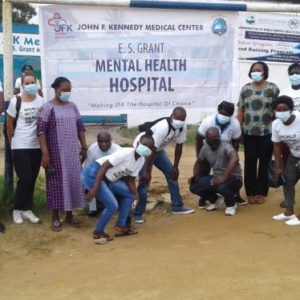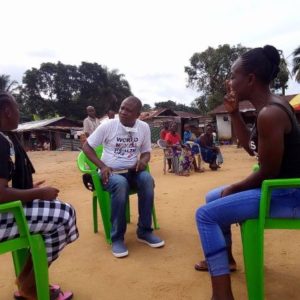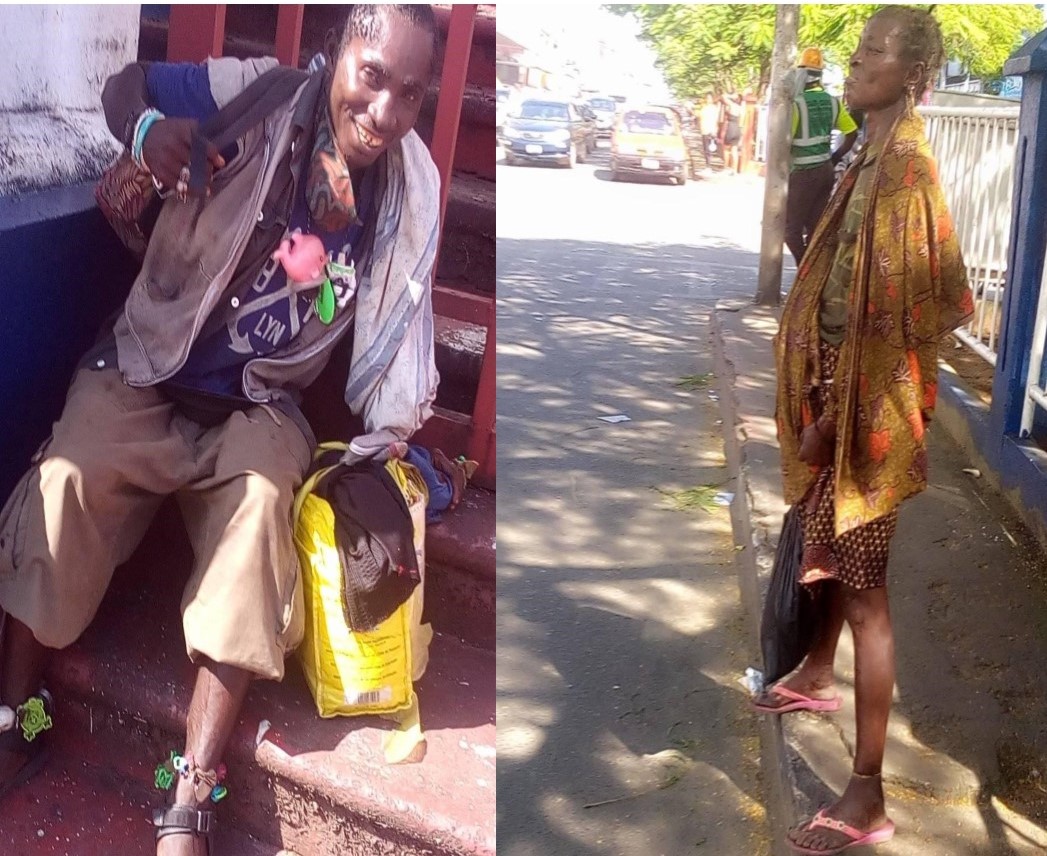More and more mentally ill persons are appearing on the streets
By Samuel G. Dweh, President—Liberia Association of Writers (LAW), and Freelance Development Journalist, Contacts —+231 (0)886618906/776583266/samuelosophy@yahoo.com/samuelosophy1@gmail.com
In this article is a story of a Liberian Immigration officer who was jailed and dismissed because he refused to connivance in drug smuggling by a team of powerful Liberian government officials.
The article ends with recommendations—solution methods. And this piece comes in the wake of the high increase in the number of mentally ill persons on the streets of this country, as calls continue to come for more support to the mental health sector.
THE “FREE WRITING SERVICE” CALL
On invitation from Mr. James Bill Crayton, Public Relations Officer of the John F. Kennedy Memorial Medical Center (Liberian Government’s #1 health institution), I attended the year 2020’s edition of the World Mental Health Day’s celebration, even though the Organizer didn’t add “media coverage fee or promotional writing fee as part of the program,” Mr. Crayton had informed me during our on-telephone discussion about the occasion on October 4.
 Participants at the out-door segment (drama performance) of the program
Participants at the out-door segment (drama performance) of the program
“The reaon I’m inviting you to be a part of the program is for you to produce an article about the event, similar to the descriptive article you wrote about the challenges at the John F. Kennedy Medical Center,” Mr. Crayton added. (He was referring to my feature article about patient bed shortage at the Government’s premier health facility, published in the Heritage newspaper of September 11, 2020; and on the website of some Liberian media institutions including Smart News, GNN, and News Public Trust)
Minutes after Mr. Crayton and I spoke, I decided on dishonoring his invitation on what I felt was “gross disrespect” by the Organizer for my profession (writing) I said to myself: “Why should I spend my hard-earned money for transportation and my intellect on promoting a program of a Government or Government-sponsored health institution that doesn’t respect by professional career by paying for my services?”
Other things I consider were my own money on electricity to power my computer while writing the story and internet data to send the finished article to Mr. Crayton’s e-mail box (from where he will forward it to the Hospital’s hierachy, who will forward it to the Hospital’s International sponsors)
However, the next day, I rescinded my decision of never to be a part of the program. I said to myself: “Will you allow the program Organizer’s disrespect for your profession and fail to exhibit your patriotic responsibility of informing the general society about another disadvantaged human section of the Country?”
On this patriotic thought, I toured some parts of Liberia’s capital, Monrovia, on 7 and 8, September, to capture, with my phone’s camera, images of street-living mentally ill Liberians—some members of the body of disadvantaged citizens to be spoken about at the World Mental Health Day’s celebration. (Some of the images are featured in this article)
On the program day (October 10), I departed my home two hours to the “10:00am” stated in Mr. Crayton’s phone-channeled message to me.
The main celebration venue was the E.S. Grant Mental Health Hospital, located in a community named “World Wide”, off Duport Road, in Paynesville, outside of Monrovia.
THE “SHOCKING” ACTIONS & STORY
In the Hospital’s fence, at 9:08, I saw physical human features, “actions”, and I heard stories (from persons being hosted) that shocked me, but sparked my spirit of empathy towards all the “drugged persons” inside the fence. These are what I saw: a huge number of “patients” (mentally ill persons) over 100 (between ages 13 and 70); many patients moving like “zombies” (remember characters in the video of the song, “Thriller”, by Michael Jackson); some were “swimming” on the grassy field (with no water); some were “throwing fists” at invisible persons; some were “singing” (when there was no musical sound); some were doing “ballet dance” (when there was no orchestra); some were violently pulling the their colleagues’ cloths and making demands (on reason sane people around couldn’t fathom); and some swarmed around me and began “waving”, “laughing” or “chuckling” to my face. I responded in similar gesture.
But, some were “calm”, many sitting on a long cement slab under the roof of one of many housing sections of the Hospital.

“Mental Health Drama” at the Occasion. Lead dramatists (Ladies)
Left-Right: Lorpu (Oretha Mulbah) and Yama (Grace W. Nyanti) in one of the acts.-
A male patient marched toward the only entry/exit point, but met a human-wall of compound security man named Adolphus Guhn.
“Go back to where you were sitting or standing!” the security man screamed at the patient whose movement appeared like that of a person on escape mission.
During my visit, the fenced compound of the E.S. Grant Mental Health Hospital contained three buildings, each painted blue and white): “Security Department”, “Dietary Department” (attached to the Security Department); “Dinning Hall” (attached to the Security Department and Dietary Department); “Administrative Building”, and “Hospital” (divided into two sections—“Male Wall” and “Female Wall”)
While waiting for start of the program at “12:00pm” (information relayed to me by the compound’s security officer), against the “10:00am” in Mr. Crayton’s message in my phone, I decided on “mingling” with some of the patients—to hear their stories for my feature article on the entire World Mental Health Day’s celebration. Each of them spoke like a mentally sound person during the interview.
“My name is Malue***, the owner of E.S. Grant Hospital,” the first person I interacted with responded to my first question.
“You are the owner of this big place—E.S. Grant Hospital?” I said to Malue, even though I knew that his current mental condition was telling him he was the “owner” of the place he had been brought into for his recovery.
“Yes, I’m the owner of E.S. Grant Hospital,” he repeated and grinned, exposing his yellowish teeth.
“Why are you in this compound?” I threw my second question.
“I am here because I was smoking grass on the Old Road, and they brought me here to stop smoking grass,” Malue responded. The Old Road, a community in Monrovia, has become one of the hotbeds of sale of all kinds of drugs in Monrovia.
The second person I mingled with gave “Cyrus…” as his name, responding to my first question. “I live in Gbankay Town, in Sinkor, Monrovia,” he responded to my second question. “Some people brought me here because I was smoking bren-bren with my brabie,” he replied to my third question. What he called “bren-bren” is another name for narcotic substance; the “brabie” is a Liberian parlance for “friend”
“My name is Benda Martha***,” replied the third person, in eloquent diction, I interacted with, much of her hair turned white (grey hair) She was one of the calm patients, sitting under the roof of the Administrative Building. “I am fifty six years of age,” she replied to the second question. “I was brought here because of the old folk’s blue, you know what I mean,” she smiled to my face. “What I mean is some persons brought me here because I was drinking my five-for-five.” She looked away from the interviewer after her last words. The “five-for-five” is probably another code name for any narcotic substance some persons mixed with food or drinks on sale in public places.
“My name is Marthaline***,” the fourth person I spoke with responded to my first question. “I am fifteen years old. I used to take bren-bren, grass, and liquor, so my parents brought me here, to stop taking those stuffs,” she responded to my second and third questions.
The next patient I met, after Marthaline, gave “Sampson***” as his name, his response to my first question. He was “preaching” to some of the guests sitting when I begged him to “also share the gospel with me.” He spoke eloquently like his senior mentally ill colleague—Bendu Martha Yates.
“I am an evangelist, and member of the Deliverance Church in Redlight. I graduated from Lott Carey High School, located in Brewerville,” he explained, without my request for the information. “I am twenty three years old,” he responded to my second question. “I started getting high in High school. I used to smoke grass, and later I started smoking ten packs of Empire cigarette per day,” he said with pride.
“Who brought you at the E.S. Grant Mental Health Hospital, and where are your parents?” I doubled questions for Sampson.
“My parents are in Nimba County. My auntie brought me here to stop smoking. She is working at Buchana’s hospital in Grand Bassa County,” he replied.
A male security officer’s announcement to me about the start of the out-door segment of the program outside of the fence prevented my movement toward another patient for her story.
***Each person’s surname left out of the article to prevent stigmatization against them in their communities
DRAMATIZATION OF THE “PROBLEM”
The out-door segment, held at the World Wide Community’s football field, three yards to the Hospital’s fence, entailed two drama performances, sponsored by Medecins Sans Frontiers (MSF), France’s global health support Organization. MSF’s Headquarters was represented at the occasion by Justine Hollard, Mental Health Project Coordinator; Amina Belhaine, Psychiatrist; and Mariele Von Nuenen, Mental Health Activity Manager.
“The E.S. Grant Mental Health Hospital is one of Medecins Sans Frontiers’ partners for our mental health programs in Liberia,” said MFS’s Mental Health Project Coordinator, responding to questions during an interview before the start of the first drama. She mentioned Star of the Sea Hospital in the Township of West Point, an over-populated community in Monrovia and other health centers in other parts of Liberia including Brewerville.
West Point, where the author of this article had spent over 17 years, from age 9, is one of the hotbeds of substance abuse by most of the community’s young people.
Only MSF’s Liberian staff featured in both drama performance.
The first act, entitled “Psychosis and the Community”, was about financial exploitation of “Lorpu” (played by Oretha Mulbah) on her desperation for healing of her mentally ill sister, “Yama”, (played by Grace W. Nyanti) by “Pastor Adolphus” (played by Carlton Logan) The “Pastor” squeezed five hundred United States dollars out of “Lorpu” as “prayer fee” to heal her sister. But the mental condition of “Yama” is still the same.
The second drama performance was entitled “Loss” and performed by the Cast in the first drama. In the drama, is alone and complaining about being abandoned after the death of her husband and the departure of her children from the house, not knowing their whereabouts. A neighbor, “Pa Flomo” (played by Edison Logan), comes to visit; she narrates her “health status” from her “loss” of her spouse and her children. “I want to leave from here,” she tells the neighbor, and she gives him a bowl for his personal use. (Yama is giving out all the things in her house)
On the other side, Yama’s sister, Lorpu, (Oretha Mulbal) is complaining about her sister’s “mental state” from her loss of her husband and children. Pa Flomo comes to visit and suggest a “medicine man” to heal the “mental illness”. Lorpu agrees, takes her sister to a “herbalist” (played by Abraham S. Kollie) who demands the following for his work: Five hundred United States dollars, one white sheep, and two packs of candles—red and white.
Desperate for her sister’s mental recovery, Lorpu gives one thousand United States dollars to the herbalist—the extra US$500 for other things he will need.
But Yama’s condition remains the same, and she attempts suicide by tying a hanging rope around her neck. A male neighbor and her sister Lorpu see her and prevent the self-murder.
A Community Health Worker (played by Rose Vokar), on her usual daily mental health sensitization tour, meets Lorpu and her mentally ill sister, explains the “causes” of mental health, and advises Lorpu to take her sister to the mental health centers licensed by the Government of Liberia. She assures of total recovery.
Lorpu expresses her doubt on healing by “medical science” where “herbalist” and “Pastor” had failed. But she later succumbs to the Community Health Worker’s persuasion and leads her mentally ill sister behind the health worker to meet a Mental Health Doctor (played by Joseph M. Dunoh) The doctor explains probable causes of mental illness (Depression, anxiety, etc.) and gives anti-depressant medications.
“Everything you saw in each of the drama performances is what happens in real-life to mentally ill people in our communities. Mental illness isn’t for a particular person or a group of persons. So, please show love to them,” explained the Acting Administrator of E.S. Grant Mental Health Hospital, Davidetta A.B. Baker, to the residents of the World Wide Community that gathered and watch the drama performances.

